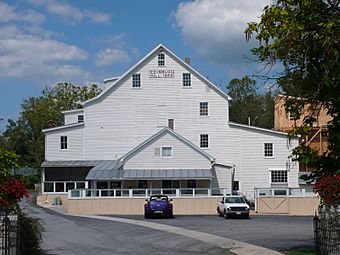Edinburg Mill facts for kids
|
Edinburg Mill
|
|
|
U.S. Historic district
Contributing property |
|
 |
|
| Location | U.S. 11, Edinburg, Virginia |
|---|---|
| Area | 1 acre (0.40 ha) |
| Built | 1848 |
| NRHP reference No. | 79003084 |
Quick facts for kids Significant dates |
|
| Added to NRHP | September 7, 1979 |
The Edinburg Mill is a historic building in Edinburg, Virginia. It was once a busy grist mill, which means it ground grain into flour. This three-story wooden building sits by Stony Creek. It has a strong base made of limestone.
The mill worked for many years, from 1848 until 1978. It is famous for almost being burned down during the American Civil War. Luckily, some local women helped save it.
Contents
What is the Edinburg Mill?
The Edinburg Mill is a special building that used to grind grain. It is located in the town of Edinburg, Virginia. The mill is made of wood and has three floors. It stands right next to Stony Creek, which provided the power for its machinery.
How Old is the Mill?
The current Edinburg Mill was built in 1848. It was constructed by the Grandstaff family. Before this mill, there was an older complex built in 1813. That older site also had a sawmill, a grist mill, and a place for carding (preparing wool).
The Mill During the Civil War
The Edinburg Mill has an exciting story from the American Civil War. In 1864, Union soldiers led by General Philip Sheridan were in the area. They were burning many buildings as part of a plan to stop the Confederate army. This plan was sometimes called a "scorched-earth campaign."
How the Mill Was Saved
General Sheridan's soldiers started to set the Edinburg Mill on fire. But some brave local women stepped in. They convinced the soldiers to save the mill's flour, which was very important for feeding people. Because of their quick thinking, the fire was put out, and the mill was saved from being destroyed.
Design of the Building
The Edinburg Mill is three stories tall. It has a large, pointed roof section called a gable. There are also smaller, sloped roof sections on the sides. A small office area was added to the front of the building. Even though it was built in the 1800s, some parts of its construction use older building methods from the 1700s.
The Mill Today
Today, the town of Edinburg owns the mill. They work with a group that helps protect old buildings. The Edinburg Mill is an important historical site. It was added to the National Register of Historic Places on September 7, 1979. It is also part of the larger Edinburg Historic District, which includes many other old buildings in the town.
 | Valerie Thomas |
 | Frederick McKinley Jones |
 | George Edward Alcorn Jr. |
 | Thomas Mensah |



